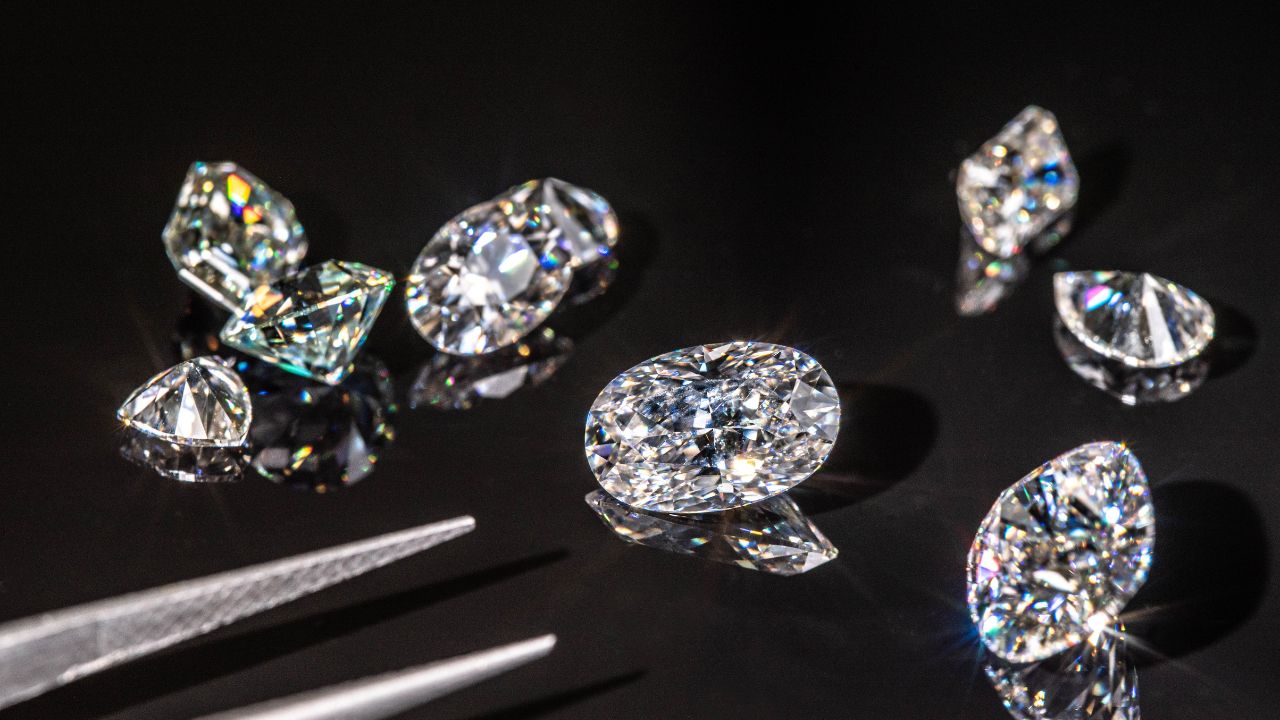
Which Gemstones Are Most Sustainable?
When it comes to jewelry, many people are now seeking sustainable options that align with their values. From eco-friendly gemstones to ethical sourcing practices, the demand for sustainable gemstones is on the rise. But which gemstones are the most sustainable? In this article, we'll explore the world of sustainable gemstones, responsible mining, and ethical sourcing.
Join us as we dive into the fascinating world of eco-conscious jewelry and discover the importance of supporting the sustainable gemstone industry.
What Are Ethical Gemstones?
Ethical gemstones are stones that have been mined, cut, and traded in a socially and environmentally responsible manner. This includes fair labor practices, such as safe working conditions and fair pay, as well as environmentally responsible mining systems that protect and restore the land. While there is no agreed-upon definition of ethical gemstones, they are generally considered to be stones that benefit the people involved in their production and minimize harm to the environment.
In terms of fair labor practices, ethical gemstones ensure that miners are provided with safe working conditions and fair wages. These practices prioritize the well-being and rights of the workers, taking into consideration their physical and mental health. Additionally, environmentally responsible mining systems aim to minimize the impact on the ecosystem and promote sustainable practices. This includes restoring the land after mining activities and implementing strategies to reduce pollution and waste.
By choosing ethical gemstones, consumers can contribute to a more sustainable and responsible gemstone industry. These stones support fair labor practices and help protect the environment, ensuring a more ethical and socially conscious supply chain. When purchasing gemstones, it is essential to ask questions and seek transparency from suppliers to ensure the stones have been sourced ethically.
| Ethical Gemstones | Benefits |
|---|---|
| Fair labor practices | - Safe working conditions |
| - Fair wages | |
| Environmentally responsible mining | - Minimizes environmental impact |
| - Restores the land |
Why Choose Ethical Gemstones?
- Supports fair labor practices
- Protects the environment
- Ensures a more ethical supply chain
- Promotes sustainable practices

To find ethically sourced gems and ethical jewelry, it is important to look for a transparent supply chain. This means knowing where the gemstone was mined, who cut it, and all the hands it passed through before reaching the consumer. Ethical gemstones should have a stated origin, as this is essential to verify the ethics of the stone. If a gemstone is labeled as "ethical" but the seller cannot provide information on sourcing and origin, it is likely not truly ethical. Consumers should ask questions and seek clear and transparent information from reputable sellers.
When searching for ethically sourced gems and ethical jewelry, consider the following steps:
- Research the seller's reputation: Look for reputable jewelers and suppliers who prioritize transparency and ethical sourcing.
- Ask for gemstone origin: Request information about where the gemstone was mined and the conditions under which it was extracted.
- Verify ethical claims: Look for third-party certifications or independent audits that verify the ethical practices of the seller.
- Consider alternative options: Explore lab-grown gemstones or vintage jewelry as more sustainable and ethical alternatives.

By following these steps and being informed consumers, we can encourage the gemstone industry to prioritize ethical practices and support a more sustainable and transparent supply chain.
When it comes to choosing gemstones with integrity, understanding the difference between ethical, sustainable, and conflict-free options is essential. While these terms are often used interchangeably, they have distinct meanings that can impact your purchasing decisions. Let's break it down:
Ethical Gemstones
Ethical gemstones are sourced, mined, and traded in a socially and environmentally responsible manner. They prioritize fair labor practices, safe working conditions, and efforts to minimize harm to the environment. By choosing ethical gemstones, you support a more responsible and transparent gemstone industry that benefits both the workers and the environment.
Sustainable Gemstones
Sustainable gemstones refer to stones that are sourced from environmentally friendly practices and are considered renewable or easily replenished in nature. While most gemstones are considered finite resources, sustainable options aim to minimize their environmental impact by adopting responsible sourcing methods and restoration initiatives.
Conflict-Free Gemstones
Conflict-free gemstones are those that do not finance or support illegal activities, civil wars, or terrorism. They are sourced from regions and mines that are free from any associations with unethical or violent practices. While ethical gemstones are typically conflict-free, it's important to note that not all conflict-free gemstones are necessarily sourced ethically.
| Gemstone Type | Ethical | Sustainable | Conflict-Free |
|---|---|---|---|
| Sapphires | ✓ | ✓ | ✓ |
| Garnet | ✓ | ✓ | |
| Amethyst | ✓ | ✓ |
It's important to note that these categories are not mutually exclusive. Some gemstones may fall into multiple categories, while others may only meet one criterion. It's essential for consumers to research and ask questions about the sourcing and ethical practices of the gemstones they are considering purchasing. This helps ensure that your gemstone choices align with your values and contribute to a more responsible and sustainable industry.
How Can You Tell if You're Buying Ethically Sourced Gemstones?
When shopping for gemstones, it is important to ensure that they are ethically sourced. Here are some key factors to consider when determining the ethicality of a gemstone:
- Traceability: Look for gemstones that have a transparent supply chain. This means that you should be able to trace the gemstone back to its origin, knowing where it was mined and who cut it. A reputable seller should be able to provide this information.
- Gemstone Origin: The origin of a gemstone is crucial in determining its ethics. Gemstones that come from countries with strong labor and environmental regulations are more likely to be ethically sourced. However, ethical gemstones can also be sourced from other countries, so it's important to do your research and ask questions.
- Ethical Gemstone Verification: Look for certifications or third-party verification that ensures the ethical sourcing of gemstones. Organizations like the Responsible Jewellery Council and Ethical Making can provide certifications for ethically sourced gemstones.
- Transparent Information: A reputable seller should provide clear and transparent information about their gemstones, including their sourcing and ethical practices. If a seller is unable or unwilling to provide this information, it may be a red flag that the gemstones are not ethically sourced.

| Organization | Key Features | Certification Process |
|---|---|---|
| Responsible Jewellery Council (RJC) | - Multi-stakeholder organization - Focus on responsible business practices - Social, environmental, and ethical standards |
- Application process - Third-party audit - Certification validity: 3 years |
| Ethical Making | - Promotes responsible jewelry-making practices - Emphasizes transparency and sustainability |
- Online self-assessment - Verification and certification |
| Fairtrade Gold | - Ensures fair prices for miners - Promotes traceability in the supply chain - Social and environmental criteria |
- Certification based on Fairtrade Standards |
These organizations play a crucial role in verifying the ethicality of gemstones and ensuring transparency in the industry. However, it's important to note that not all ethically sourced gemstones may carry these certifications. The key is to ask questions, seek transparent information, and make informed decisions based on your own research and values.
How Consumers Can Change The Gemstone Industry
Consumer activism plays a crucial role in driving positive change in the gemstone industry. By demanding more transparency and better conditions for miners, consumers have the power to make a significant impact. Ethical gemstone demand is on the rise, and by actively supporting and prioritizing ethical sourcing, consumers can create a strong incentive for the industry to improve.
One way consumers can drive change is by asking questions about the origin and sourcing of gemstones. By showing that they care about ethical practices, consumers can push the industry to prioritize transparency. This, in turn, encourages gemstone suppliers and retailers to adopt and enforce fair labor practices, improve working conditions for miners, and establish environmentally responsible mining systems.

Industry transparency is another key area where consumer activism can make a difference. By promoting transparency throughout the supply chain, consumers can hold gemstone suppliers and retailers accountable for their practices. This includes seeking clear information on the mining, cutting, and trading processes of gemstones, as well as verifying the claims made by sellers about the ethical nature of their products.
By prioritizing ethical sourcing, consumers can also contribute to the improvement of working conditions for miners. Fair pay, safe working conditions, and the protection of workers' rights are essential elements of ethical gemstone production. By supporting and demanding ethical practices, consumers can help create a more sustainable and responsible gemstone industry.
| Consumer Activism | Ethical Gemstone Demand | Industry Transparency | Improved Working Conditions |
|---|---|---|---|
| Consumers have the power to drive positive change in the gemstone industry. | The demand for ethical gemstones is growing as consumers prioritize ethical sourcing. | Transparency throughout the supply chain is essential to hold suppliers and retailers accountable. | By supporting ethical practices, consumers contribute to better working conditions for miners. |
| Consumers can ask questions and seek transparent information from sellers. | By showing a preference for ethical gemstones, consumers create incentives for the industry to improve. | Transparency helps ensure that gemstone claims are verified and that ethical practices are upheld. | Fair pay, safe working conditions, and workers' rights are prioritized with ethical sourcing. |
What Areas Have the Most Ethical Gemstone Mining?
When it comes to ethical gemstone mining, certain countries have established a positive reputation for their responsible practices. The United States, Canada, and Australia are known for their stringent labor and environmental laws that ensure ethical standards in the gemstone industry. These countries prioritize fair labor practices, safe working conditions, and environmentally responsible mining systems.
However, it's important to note that ethical gemstones can also be sourced from other countries. The key is to ask questions and find reputable suppliers who can provide transparent information about the origin of the gemstones. Transparency and a stated origin are crucial in verifying the ethics of a gemstone.

By supporting gemstone mining from these regions and demanding transparency, consumers can play a role in promoting ethical practices in the industry. Additionally, the availability of ethical gemstones from various countries provides consumers with a wider range of options to choose from.
| Country | Benefits | Challenges |
|---|---|---|
| United States | Fair labor practices, strict environmental regulations | Higher labor and production costs |
| Canada | Ethical sourcing, responsible mining practices | Limited availability of certain gemstones |
| Australia | Environmental sustainability, focus on community development | Higher transportation costs for international buyers |
Ethical Gemstone Sourcing: Our Commitment at Caldera Gem
At Caldera Gem, we are committed to responsibly sourcing ethical gemstones. We work closely with trusted gemstone dealers from around the world to ensure that our gemstones are ethically and sustainably obtained. One of our key sourcing principles is prioritizing mine-to-market gemstones, which allow us to trace the entire supply chain and provide transparency to our customers.
Our partnership with ethical gemstone dealers ensures that the gemstones we offer meet our high standards for social and environmental responsibility. These dealers follow strict environmental laws during the mining process to minimize the impact on natural habitats. They also prioritize fair pay and safe working conditions for miners, supporting the well-being of the communities involved in the gemstone industry.
Transparency is of utmost importance to us. We believe that it is essential for our customers to know the origin and practices of the gemstones they purchase. By asking questions and verifying the details of specific mines, we strive to provide a clear and traceable path for our gemstones. This commitment to responsible gemstone sourcing allows us to offer our customers ethical and traceable gemstones that align with their values.
When you choose Caldera Gem, you can be confident that the gemstones you purchase are ethically sourced. We are dedicated to making a positive impact in the gemstone industry by promoting responsible sourcing practices and supporting the well-being of the communities involved. Join us in our mission to create a more sustainable and ethical future for the jewelry industry.
Conclusion
The demand for sustainable and ethical gemstones is on the rise as conscientious consumers prioritize responsible sourcing. Ethical gemstones are those that are mined, cut, and traded in a socially and environmentally responsible manner. By asking questions, seeking transparency, and supporting ethical practices, consumers have the power to make a positive impact on the gemstone industry.
Choosing sustainable and ethical gemstones not only benefits the environment but also contributes to fair labor practices and the preservation of natural habitats. These gemstones have a smaller environmental footprint, helping to reduce the industry's impact on the planet. By supporting responsible sourcing, consumers can drive change and encourage the adoption of more ethical practices in the gemstone industry.
With increasing consumer demand for sustainable and ethical products, jewelers and suppliers are being incentivized to prioritize responsible practices. This shift in consumer behavior can lead to a more responsible and eco-conscious approach to jewelry as a whole. By making informed choices and supporting brands that prioritize sustainability and ethical sourcing, consumers can be part of the movement towards a more ethical and environmentally friendly jewelry industry.
FAQ
Which gemstones are most sustainable?
Sustainable gemstones are those that have a smaller environmental footprint and are responsibly sourced. This includes gemstones that are mined, cut, and traded in a socially and environmentally responsible manner.
What are ethical gemstones?
Ethical gemstones are stones that have been mined, cut, and traded in a socially and environmentally responsible manner. This includes fair labor practices and environmentally responsible mining systems.
How can I find ethically sourced gems and ethical jewelry?
To find ethically sourced gems and ethical jewelry, it is important to look for a transparent supply chain. This includes knowing the gemstone's origin and seeking clear and transparent information from reputable sellers.
What is the difference between ethical, sustainable, and conflict-free gemstones?
Ethical gemstones refer to stones that have been mined, cut, and traded in a socially and environmentally responsible manner. Sustainable gemstones are easily replenished or renewable. Conflict-free gemstones do not fund terrorism, civil wars, or similar actions.
How can I tell if I'm buying ethically sourced gemstones?
To ensure ethical sourcing, look for gemstones with a transparent supply chain. This includes knowing the gemstone's origin, who cut it, and all the hands it passed through. Reputable sellers should provide clear and transparent information about their gemstones.
How can consumers change the gemstone industry?
Consumers can drive positive change by demanding more transparency and better conditions for miners. By asking questions about the origin and sourcing of gemstones, consumers can show they care about ethical sourcing and encourage the industry to prioritize ethical practices.
What areas have the most ethical gemstone mining?
Countries like the U.S., Canada, and Australia have a positive reputation for ethical gemstone mining. These countries have stringent labor and environmental laws that ensure ethical practices in the industry. However, ethical gemstones can also be sourced from other countries.
How do you responsibly source ethical gemstones at Caldera Gem?
At [Brand Name], we work with trusted gemstone dealers all over the world to responsibly source ethical gemstones. We prioritize mine-to-market gemstones that are fully traceable and partner with dealers who follow strict environmental laws and ensure fair pay and safe working conditions for miners.
What is the impact of choosing sustainable and ethical gemstones?
Choosing sustainable and ethical gemstones can have a significant impact on the gemstone industry. It promotes responsible sourcing, fair labor practices, and the preservation of natural habitats. It also encourages the industry to prioritize ethical practices and improve working conditions for miners.


